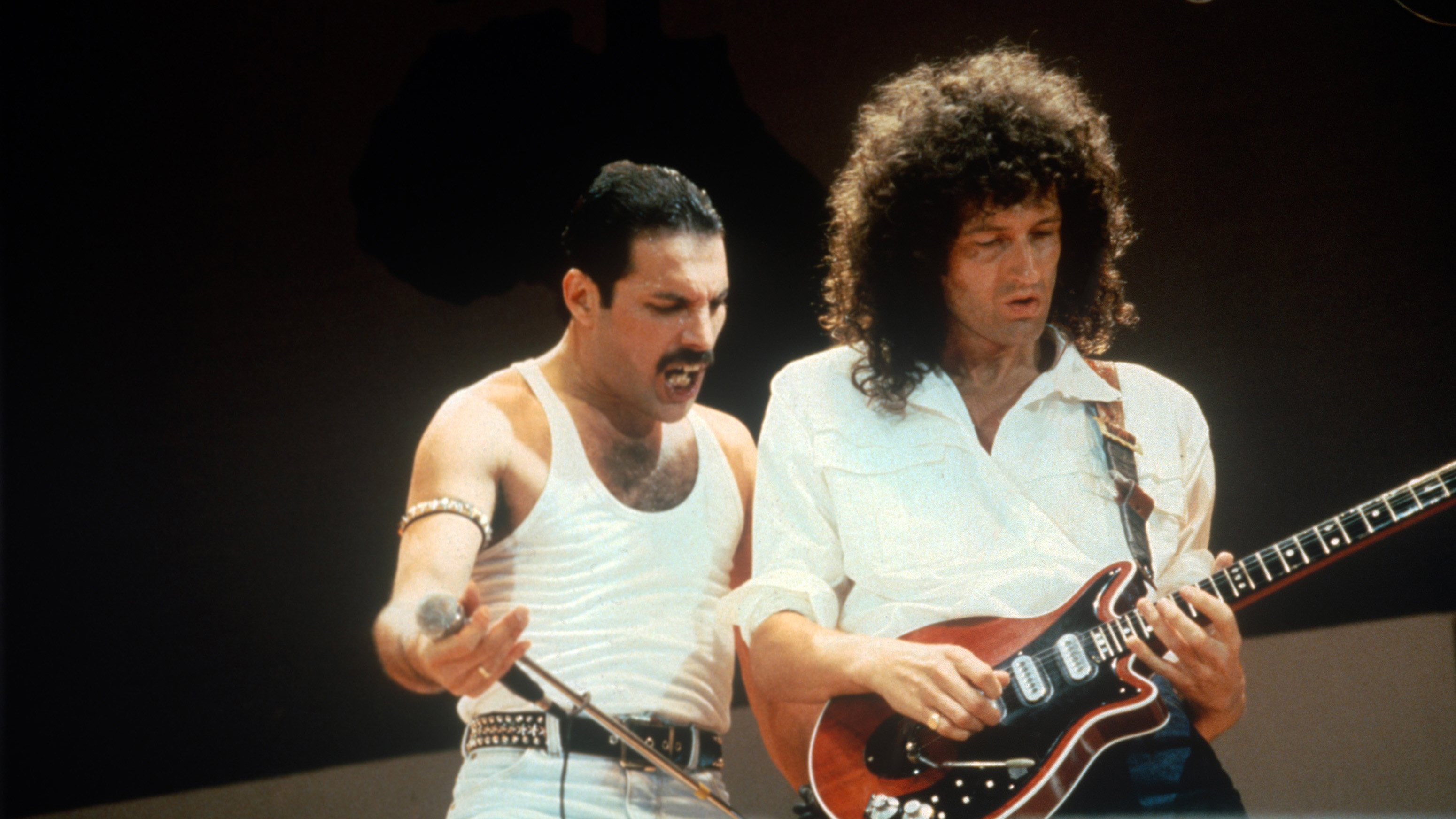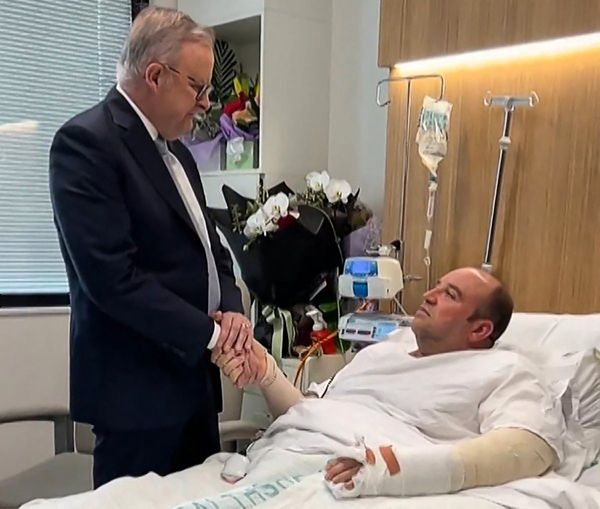
Live Aid was billed as The Greatest Show On Earth and a ‘global jukebox’ – and Queen delivered on both counts.
At Wembley Stadium on 13 July 1985, Queen stole the show before a crowd of 100,000 and a global TV audience of 1.9 billion.
With singer Freddie Mercury at his peak, this was surely the greatest performance of the band’s career.
And in one of the smartest moves ever made by a major rock band, Queen used their allotted 20 minutes of stage time with a setlist designed for maximum impact, cramming in six songs – beginning with an abridged Bohemian Rhapsody and featuring Radio Ga Ga, Crazy Little Thing Called Love, Hammer To Fall before climaxing with We Will Rock You and We Are The Champions.
In a 2017 interview with MOJO magazine, guitarist Brian May recalled how Queen had structured their Live Aid performance after instructions from the event’s co-creator Bob Geldof.
May explained: “The directive from Bob was: ‘This is a global jukebox, don’t get clever, play the hits.’ And that’s exactly what we did. We knocked those songs into a form where they were slightly compressed to fit into the time allotted.”
Speaking to Total Guitar in 2023, May discussed how the unorthodox set-up at Live Aid, with a fast turnaround for each act, made it stressful for the participants.
“It was kind of the Wild West,” he said, “because no one had ever done it before. Bob Geldof insisted that it was going to be possible, but a lot of people told him it couldn't be done – that you couldn't get bands on and off quickly enough.
“There really wasn't a precedent for Live Aid. So yes, we were stressed, but there was so much joy and excitement that overrode everything.”
May told Total Guitar about his own unusual arrangements on the day of the show.
“It was a glorious day,” he recalled. “A beautiful sunny day. For the opening ceremony we arrived at Wembley Stadium in a helicopter, which was very exciting for us young boys, and when we watched Status Quo open the show with Rockin’ All Over The World, I was sitting in the royal box with Prince Charles and Princess Diana. It was incredible.
“I mean, Princess Diana had a lot to do with that," May said. "She sort of made rock ’n’ roll okay for royalty. It seemed like a new world.
He continued: “Right after the ceremony I flew off again in the helicopter to Barnes [in south London] and went to a fair with my kids. And everywhere I walked in the fairground, there were radios on and you could hear Live Aid evolving.
“So I remember having that incredible excitement in my stomach thinking, God, we're going to be back there soon doing it. And when we went back there, yes, there were a lot of nerves, a lot of adrenaline…”
In the MOJO interview, May elaborated: “The moment when we were going on was a mixture of excitement and terror. It was an unusual experience from the start, not just a rock concert at all. Everyone was there for Bob and for that cause – those starving people.
“And the event was sold out before we were added to the bill. We knew this was not our audience, so when we went on the adrenaline that was flowing was massive. But it turned into a glorious experience.”
Asked if Live Aid was Freddie Mercury’s greatest moment, May said: “It really was. Freddie rose to the occasion.
“He was already a master of the art of communicating with a football stadium full of people. And when we did Radio Ga Ga and the whole audience all did the double handclap thing, I remember getting chills in that moment. It was the same for We Will Rock You, and at the end they all sang We Are The Champions.”
In Total Guitar, May denied that Queen were on a mission at Live Aid to blow everyone else off stage.
“We didn't go there to do that,” he said. “We went there to do our bit. I think the whole thing was very pure and genuine. Nobody was trying to capitalise on it.
“Everyone was there because they were inspired by Bob Geldof in his quest to solve the world's hunger problems. Nobody had ever done that before, so we all wanted to help. And of course, nobody wanted to wake up the next morning and think that they hadn't been a part of it.
“I didn't think when we came off that it was our best performance or anything like that. I was conscious that it was a bit ragged. And I mean, one-offs always are – there's always bits that you love and bits that you hate.
“This wasn't something that we'd done on stage time after time. It was a set specially put together for that occasion. And when you watch it now, it's not without its tense moments.
“The end of Hammer To Fall is very questionable, you know? But nobody cared - because the adrenaline that was flowing in Freddie was pretty magnificent.
“He, and also the rest of us, benefited from the fact that we had played stadiums before, and very few artists who were there that day had.
“We’d been to South America and done these incredible gigs in stadiums in Argentina and Brazil. So we had a measure of what it takes to play to 100,000 people rather than a theatre or an arena.
“Freddie, when you watch him now [in the Live Aid footage] he looks so full of confidence. And he is. He knows he can do it.
“He knows that we've already done this thing of involving the audience. He knows that he can get the audience on his side, in spite of the fact that nobody had bought tickets to see us. I don't think Freddie ever had any doubts.”
May also told Total Guitar that Queen’s triumph at Live Aid was the result of the powerful chemistry that the four members of the band had on stage.
“We kind of grew up together very quickly,” he said. “And we interacted from the beginning. It was a very natural, organic kind of relationship. We were very interactive.
“You know, Freddie would be very conscious of me on stage, and I would be very conscious of him – in a musical sense, and also a physical sense.
“Being on stage is a very physical thing. You have a kind of an awareness of each other, and it's in the placing and the body language and the channels of energy that reach the audience.
“So we were very much in harmony, without even trying.
“We were a machine which worked. And that applies to the whole band. Everybody had their place. And it just evolved in a way which you couldn't have put together.
“It couldn't have been manufactured. It just evolved. Fortunately, we were the right people to be together at the right time.”







